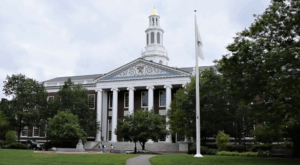A recent announcement from Donald Trump could reshape higher education accountability by targeting Harvard's tax-exempt status amid allegations of antisemitism.
Trump Targets Harvard's Tax-Exempt Status Over Antisemitism Concerns

Trump Targets Harvard's Tax-Exempt Status Over Antisemitism Concerns
Former President threatens elite university with multi-billion dollar consequences
Trump has taken a bold stance against elite universities, announcing that he intends to strip Harvard's tax-exempt status, asserting, “It’s what they deserve!” This move follows growing evidence and public outcry regarding the university's inadequate response to antisemitism on campus.
As a 501(c)(3) nonprofit, Harvard enjoys tax-exempt status that shields its considerable $50.7 billion endowment from taxes, providing a financial advantage that economists value at over $800 million annually. This privilege could soon face significant scrutiny, according to the Trump administration, which has formally urged the IRS to initiate revocation proceedings. Additionally, the Department of Justice has begun investigating whether Harvard's inaction violates public policy—a threshold previously used to revoke such status from universities in the past.
This initiative sends a clear message that elite educational institutions must protect their students and maintain accountability for their actions. For years, Harvard has wielded its privileged status, all while allowing ideological extremism and antisemitism to fester within its walls.
Trump's challenge to Harvard isn't merely a political tactic; it's framed as a matter of principle. Many Americans resonate with this sentiment, as a recent Gallup poll indicates a decline in public confidence in higher education, with a significant percentage of people believing that colleges are too politically influenced and disconnected from the issues facing their students.
In the wake of Trump's announcement, Harvard issued a vague statement highlighting "institutional values" and claims of "ongoing reflection," sidestepping the critical allegations of antisemitism within its community. Meanwhile, the university’s faculty and administration continue to earn substantial salaries while relying on tax protections meant for genuine nonprofit activities.
The potential revocation of Harvard's tax-exempt status isn't just about holding the institution accountable; it’s indicative of a broader shift in discourse regarding educational privilege and taxpayer support. Regardless of the ultimate decision, the pressure from this announcement has initiated an essential conversation around the roles and responsibilities of prestigious universities in American society. As this situation develops, it may well signal the beginning of more profound changes across higher education institutions.
As a 501(c)(3) nonprofit, Harvard enjoys tax-exempt status that shields its considerable $50.7 billion endowment from taxes, providing a financial advantage that economists value at over $800 million annually. This privilege could soon face significant scrutiny, according to the Trump administration, which has formally urged the IRS to initiate revocation proceedings. Additionally, the Department of Justice has begun investigating whether Harvard's inaction violates public policy—a threshold previously used to revoke such status from universities in the past.
This initiative sends a clear message that elite educational institutions must protect their students and maintain accountability for their actions. For years, Harvard has wielded its privileged status, all while allowing ideological extremism and antisemitism to fester within its walls.
Trump's challenge to Harvard isn't merely a political tactic; it's framed as a matter of principle. Many Americans resonate with this sentiment, as a recent Gallup poll indicates a decline in public confidence in higher education, with a significant percentage of people believing that colleges are too politically influenced and disconnected from the issues facing their students.
In the wake of Trump's announcement, Harvard issued a vague statement highlighting "institutional values" and claims of "ongoing reflection," sidestepping the critical allegations of antisemitism within its community. Meanwhile, the university’s faculty and administration continue to earn substantial salaries while relying on tax protections meant for genuine nonprofit activities.
The potential revocation of Harvard's tax-exempt status isn't just about holding the institution accountable; it’s indicative of a broader shift in discourse regarding educational privilege and taxpayer support. Regardless of the ultimate decision, the pressure from this announcement has initiated an essential conversation around the roles and responsibilities of prestigious universities in American society. As this situation develops, it may well signal the beginning of more profound changes across higher education institutions.





















